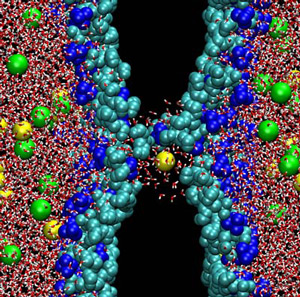Pore-Mediated Ion Transport Across Phospholipid Membranes

Trafficking of ions through cell membranes, being coupled to energy transduction, is central to many cellular processes and functions. While the transmembrane ion movement in cells is mainly mediated by specialized proteins, ions (as well as some small hydrophilic molecules) can leak in small amounts unassisted through transient defects that include water pores. Furthermore, unassisted but enhanced transport of solutes through cell membranes is an important prerequisite of many biomedical and biotechnological applications that include cryopreservation and drug and gene delivery: it is highly desirable if one could induce, at will and in a controlled manner, transient defects such as pores in biological membranes. Therefore, our simulation studies address the problem of ion transport through both pores formed due to transmembrane ionic charge imbalance as well as induced by chemical means, e.g through addition of dimethyl sulfoxide (DMSO), a solvent widely used in cell biology.
Other projects:
- Asymmetric Phospholipid Membranes
- Electroporation Phenomena
- Cation-Mediated Interactions of DNA with Phospholipids
- Interaction of Polycations with Phospholipid Membranes
- Complexes of DNA with Cationic Polymers

